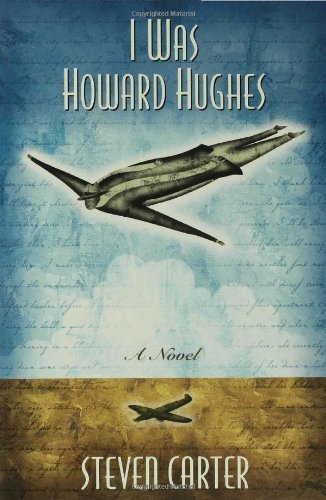A Fair Trade Book
Title: I Was Howard Hughes
Author's agent's web page for author: https://amsterlit.com/site/carter-steven/
Date: 2003
Publisher: Bloomsbury
ISBN: 1-58234-375-6
Length: 221 pages
Quote: “Howard Hughes was the richest man in America in the 1960s and 1970s...and most media accounts of him from these two decades describe him as a shadowy figure...”
The primary purpose of this novel is to bring Hughes back out of the shadows. Before Michael Jackson was tagged as the rich eccentric in the United States, Hughes was far beyond eccentric, so quirky he made Michael Jackson seem normal even before Hughes’ long, long last illness.
Carter’s novel fleshes out the preposterous facts of the oddest true stories about the billionaire aviator with a series of fictional documents and interviews, allegedly collected by Alton Reece, a fictional biographer. Hughes really did date a series of movie stars but their interviews with Reece are not only implausible but, apparently, posthumous.
Reece is, of course, a fictional character created to illustrate the ease with which a biographer can overidentify with his subject. While researching Hughes’ notoriously dysfunctional relationships with women, Reece gets divorced. While researching Hughes’ road trips incognito, Reece starts travelling with a coffin-sized box and stealing his interviewees’ property. It becomes obvious that Reece is really trying to “be” Howard Hughes.
To what extent could even the young, relatively healthy Howard Hughes have “been” the old, sick Howard Hughes? Carter doesn’t even try to answer this difficult question. The real Howard Hughes was definitely a drug addict, and almost certainly had brain damage caused by an infectious disease, during the last twenty years of his life. This novel doesn’t carry Alton Reece that far forward in time, and thus leaves readers free to debate and speculate about how Hughes’ rich-boy eccentricities related to his eventual dementia.
The novel does, however, explain one of the major contradictions of Hughes’ demented phase. Why was he apparently obsessed with avoiding other people’s germs and, at the same time, indifferent to the risk of reinfection or additional damage from his own germs? Hughes became mildly obsessed with avoiding other people’s germs because his mother died of an infectious disease, but became seriously obsessed with protecting other people from his germs when he realized the unpublicized truth about his illness. Apparently he was one of the people who believe that disease germs already present in the body can’t aggravate any problem the body may have. This is untrue, but Hughes was by no means the only person who believed it, in the 1970's.
Recommended to anyone who can handle a novel about the eccentricities of the super-rich, with moderate amounts of sex, violence, and bad language, and not feel tempted to “be” Howard “I Can Buy My Way Out of Anything” Hughes. The facts of Hughes' tragic, though not entirely wasted, life are interesting and will appeal to all who enjoy celebrity gossip.
The local writer known as Steven Carter is a different person, and more private, than the older writer known as Steven A. Carter, who wrote Men Who Can't Love and a series of follow-ups. I respect Steven Carter's privacy so all I'll say about the author of this book is that, if you send $5 per copy + $5 per package + $1 per online payment to either address at the bottom of the screen, I'll send $1 per copy to Carter or a charity of his choice, in care of his agent.
and a series of follow-ups. I respect Steven Carter's privacy so all I'll say about the author of this book is that, if you send $5 per copy + $5 per package + $1 per online payment to either address at the bottom of the screen, I'll send $1 per copy to Carter or a charity of his choice, in care of his agent.

No comments:
Post a Comment